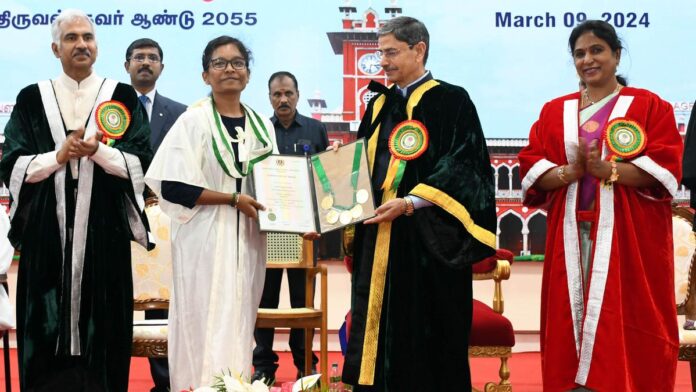
Governor and Chancellor R.N. Ravi presenting degree certificate to a graduand at the convocation of Tamil Nadu Agricultural University in Coimbatore on Saturday. From left, Manoj Ahuja, Secretary, Department of Agriculture and Farmers’ Welfare, Government of India, and Vice-Chancellor V. Geethalakshmi are also seen.
| Photo Credit: SPL.
Entrepreneurial opportunities await agricultural graduates in rural India amid challenges, Manoj Ahuja, Secretary, Department of Agriculture and Farmers Welfare, Government of India, told graduands of Tamil Nadu Agricultural University (TNAU), Coimbatore, on Saturday.
Referring to the fragmented land-holding as the main challenge, Mr. Ahuja saw scope for the about 30,000 agricultural graduates passing out every year across India to explore start-up opportunities in 6.5 lakh villages against the backdrop of the holdings of 86% farmers being small or marginal categorisations, while addressing the 43rd annual convocation of TNAU.
During the ceremony, Governor and Chancellor R.N. Ravi conferred degrees on 3,720 UG, PG and Ph.D. graduands in the presence of Mr. Ahuja and Vice-Chancellor V. Geethalakshmi.
Mr. Manoj advocated strong presence of start-ups in villages for aggregation at the local level: forming cooperatives and farmer producer organisations, and extending them branding/ marketing support. The start-ups could play roles in bringing crops under insurance cover, making the most of digital technologies to take knowledge to farmers, forming cooperatives and farmer producer organisations and initiating them into e-marketing, provide them branding support, and in establishing agricultural infrastructure such as cold storages to eliminate demand-supply mismatch and therefore, secure best prices for produces, he said.
Other areas where the farmers require support is in deployment of micro-fertigation systems, nano-urea application, indigenisation of imported technologies for precision farming, creating digital public infrastructure compatible with universal protocols, and in taking the benefits of AI (Artificial-Intelligence) based language-customised support to farmers, Mr. Ahuja added.
There was now a possibility for farmers to raise maize and sugarcane crops specifically for fulfilling the country’s requirement of ethanol, which is now being mixed with petrol to the extent of 12% and likely to be increased to 15% in a year’s time.
The country’s priority for agriculture over a decade has reflected in a five-fold increase in budgetary allocation – from ₹25,000 crore to ₹1,25,000 crore, he said.
Referring to India’s leadership among G-20 nations as signifying South-South cooperation, Mr. Ahuja said the demand for Indian agriculture students for dissemination of best knowledge and practices were high in the African countries.
Listing the achievements of TNAU, the Vice-Chancellor said plans were afoot to improve industry-ready employable skills of students by forging collaborations with 150 agri-related industries.
During 2023 alone, 212 projects with a total outlay of ₹53.15 crore was obtained, the Vice-Chancellor said.




































